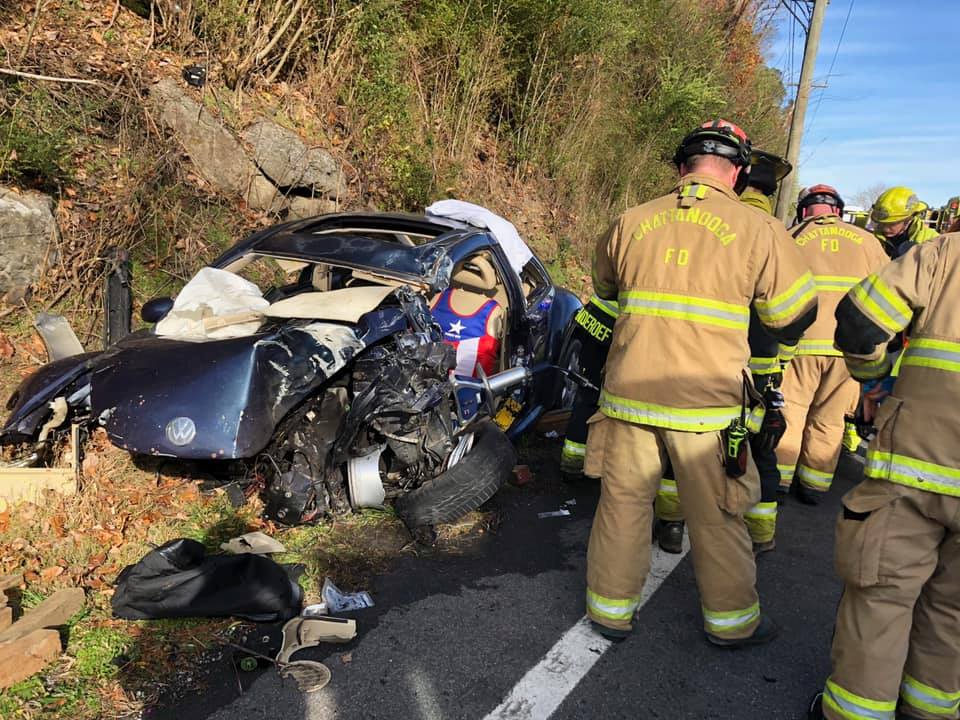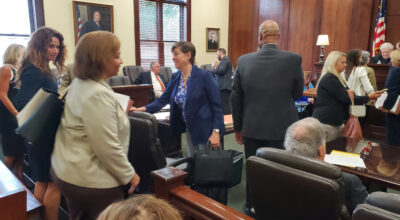
This wreck in Chattanooga is between a VW and a dump truck, with the truck catching fire. Chattanooga fire department crew members assist Tri-Community Volunteer Fire Department with rescue efforts Wednesday, with the traveler airlifted to Erlanger medical center. (Photo Chattanooga fire department)
CHATTANOOGA, Tenn, Tuesday Oct. 10, 2023 — I am suing Tennessee revenue commissioner David Gerregano for operating an oppressive and illegal program that benefits his allied insurance companies, all 350 of them who are “approved” under the data-mining arrangement made between the state and the for-profit corporations.
By David Tulis / NoogaRadio Network
Problem with the friendly datamining game is that there is no filter on the search, and everyone with a car or truck registered as a motor vehicle with the revenue people is pulled into a police dragnet.
Tennessee is not a mandatory insurance state. But “policy” of arbitrary and capricious origin pretends that we are, and runs roughshod over the Tennessee financial responsibility act of 1977, which makes Tennessee an “after-accident” state, according to all the court rulings in state and federal court.
With no filter, the “search” by a cop or deputy finds every person on the road who doesn’t have a motor vehicle insurance policy, and criminally charges that person — yes, criminally charges that person with, obviously, a crime, a misdemeanor.
The law applies only to people who have had a qualifying accident, with F$1,500 more in physical damage, and/or injury or death. These people, if they are operating a motor vehicle, or driving it, must submit themselves to the commissioner of safety. The law at T.C.A 55-12-101 et seq says such a person has 20 days to show proof of financial responsibility to the commissioner. If they show financial responsibility, they are compliant with law. They are obeying it.
That, in other words, is how to obey with the law.
Proof of insurance is only one way to show this “financial responsibility.” The other three include affidavits showing the parties (who may have no insurance) have made arrangements to settle any dispute or harm, a surety bond big enough to cover the damage, or sending the commissioner of safety, Jeff Long, a check for the amount of the damage.
I am demanding that revenue commissioner Gerregano, represented by attorney Camille Cline, submit to my questions in this case. If he were obeying the law, there’d be no need for deposition. But because he is outside of law — violating it — the case presents a fact-rich area for discovery.
Mrs. Cline doesn’t want him deposed because he is way, way above the particulars of this case and too busy, with 800 people on staff.
I am suing to restore my right to do commerce on the public road, and also the right of ingress and egress (aka the right to travel).
Objection to motion to quash, motion to compel
Petitioner objects to the motion to quash that alleges the commissioner doesn’t know about particular facts of his case and therefore should not be deposed about the policy that injures petitioner on his authority as repeatedly invoked in T.C.A. § 55-12-101 et seq.
Petitioner under the rules of civil procedure has a right to set forth his theory of a case in agency no less than he would in chancery, circuit or U.S. district court. The case record is set entirely in agency proceedings. T.C.A. § 4-5-319. Records. Judicial review “shall be ***be confined to the record” T.C.A. § 4-5-322. That means all the work of litigation occurs in agency proceedings. Suit alleging harm or injury by a party gives his victim every right to depose him before trial, or before the official hearing in agency.
Gerregano refuses to answer questions under oath
The uniform administrative procedures act, in which realm the action commences, does not derogate the common law (“This chapter shall not be construed as in derogation of the common law,” Tenn. Code Ann. § 4-5-103). The UAPA leaves common law rights untouched. Petitioner intends to maintain all his rights at all times, and to yield none, and has right to depose commissioner suing him in agency, as the commissioner is prosecuting the case and the moving party creating the harm in breach of due process.
Commissioner is prosecutor of case
The commissioner says he has “no personal knowledge relating to” the suspension and doesn’t have “direct oversight or management” of the EIVS office obeying his policy and suspending petitioner’s registration. He explains that “demands on my time are substantial” with “over 800 employees.” Considering remoteness of petitioner’s personal facts and the commissioner’s not doing administrative grunt work, he indicates, a deposition “would cause an undue burden” and take “time away from more pressing matters of government business.”

David Gerregano, Tennessee revenue commissioner
Is compliance with state law not always and in every way the most pressing government obligation, the “matter of government business” the very purpose of this contested case?
Even a casual reading of TFRA indicates that the party executing the statute upon petitioner is not the department of revenue, not the EIVS office, not the financial responsibility section, but the respondent commissioner of revenue.
The “commissioner of revenue” appears repeatedly as chief actor in revocation acts.
➤ After a qualifying crash, a person who has failed to show financial responsibility and is under sanction must immediately “return to the commissioner of revenue that person’s registration,” or receipt of an order to be sent to that person by the commissioner, failure to obey such order being a misdemeanor crime. § 55-12-127. Surrender (emphasis added).
➤ After a qualifying crash putting a person under the authority of TFRA, if that person fails to act within 20 days in reporting to the commissioner of safety, “the commissioner of revenue shall issue a notice of suspension of the registration of the motor vehicle involved” § 55-12-104 (emphasis added).
➤ “If the registration of the motor vehicle involved in the accident has been suspended, upon receipt of that payment, the commissioner of safety shall request that the commissioner of revenue reinstate the motor vehicle owner’s registration and, upon payment to the commissioner of revenue of the appropriate motor vehicle registration fees *** ” § 55-12-104 (emphasis added).
➤ “Upon restoration of a person’s license, the commissioner of safety shall request that the commissioner of revenue reinstate the motor vehicle owner’s registration and, upon payment to the commissioner of revenue of the appropriate motor vehicle registration fees *** that registration shall be reinstated immediately” § 55-12-114 (emphasis added).
➤ The commissioner receives money from the public. After a suspension, a driver or owner may have his privileges restored if he can “maintain for three (3) years, proof of financial responsibility,” pay a fee and pass an exam; the driver’s “condition precedent to the restoration of the license” being met and the license and registration obtained, “the commissioner of safety shall request that the commissioner of revenue reinstate the motor vehicle owner’s registration and, upon payment to the commissioner of revenue of the appropriate motor vehicle registration fees” § 55-12-114 (emphasis added).
➤ In § 55-12-118. Judgments and decrees, “the commissioner of revenue shall revoke all of the motor vehicle registrations of any resident or nonresident against whom the judgment is rendered, if the judgment is not paid within sixty (60) days from the date of final judgment.” The commissioner of revenue is the heavy, using the U.S. mails in the operation of his policy (supposedly pursuant to state law):
If a policy of insurance or a bond required under this section and issued to any person is cancelled or terminated, the commissioner of safety shall suspend the license of that person and shall request that the commissioner of revenue suspend that person’s motor vehicle registration, unless the person has filed proof of another policy or bond meeting the requirements of this part, and the license of that person shall immediately be surrendered to the commissioner of safety and that person’s motor vehicle registration shall immediately be surrendered to the commissioner of revenue. Any notice of suspension issued under this section shall be sent by United States mail to the last known address of the person
- 55-12-126. Maintenance of proof; suspension of license and registration (emphasis added)
➤ TCA 55-12-204 states, “The commissioner of revenue shall develop, implement, and administer an insurance verification program” under which instant case is administratively prosecuted apart from the law above by “the department of revenue or its designated agent” under T.C.A. 55-12-210.The point is clear. The law makes Cmsr. Gerregano the moving party in every motor vehicle registration revocation case.
Mr. Gerregano’s affidavit makes alarming claims as he demurs. In ¶ No. 2, his statement “I have no personal knowledge relating to the suspension of the motor vehicle registration issued to the Petitioner” is a damning admission against the law he is personally entrusted by the governor to administer. Either he is incompetent or negligent in being so far removed from the facts of the case.
The commissioner’s citations to cases involving CEOS facing deposition (motion p. 4) are irrelevant when black-letter law in TFRA makes respondent this case’s central movant — revoking registrations, reinstituting them, collecting registrations and fees, or surveilling parties subject to TFRA whom troopers and police can more quickly detect using Atwood-enabled data mining of insurance company customer lists under EIVS.
Notices on the agency website and citation to attorney general opinion N. 03-084, from 2003, (motion pp. 5, 6) are of no help to Cmsr. Gerregano. His position “is supported by applicable legal authority,” he claims, and is “supported by the statutory framework.” Oh? Which legal authority? Which “framework”?
Because he has agents, Gerregano argues, he’s not liable for the harm alleged in this “as applied” and procedural due process claim.
The doctrine respondeat superior prevents him from offloading responsibility for his actions on department employees Christine Lapps, John Duncan, Robert Shawn Ploss, Courtney Swim or other persons by claiming he lacks “facts relevant to [petitioner’s] claim.” A practicing attorney and officer of the court, Cmsr. Gerregano knows these verities regarding principal and agent.
Petitioner has every right under UAPA to establish a complete record of the controversy and challenge the regime of mandatory insurance in an after-accident financial responsibility state.
If petitioner needs to get eyewitness testimony and evidence about policy, authorities and application of policy to particular fact bases, it has to be done in agency in creating the case record for appeal. Petitioner is obeying a known legal duty to exhaust administrative remedies in pursuit of his remedy, which duty in agency in no way abrogates his common law and constitutionally guaranteed right to due process. This duty impels operation of the right to discovery and to depose.
No harm to deponent
Nothing “relating to” TFRA at T.C.A.§ 55-12-101 et seq would be outside the scope of deposition. Nothing that petitioner intends to ask deponent meets the test of “annoyance, embarrassment, oppression, or undue burden or expense” Tenn. R. Civ. P. 26.03, contrary to suggestion by respondent. Cmsr. Gerregano says to be compelled to explain the facts regarding policy creating the facts of this case would be an “undue burden” and, citing Tenn. R. Civ. P. 45.07, says it would be “unreasonable and oppressive” (motion pp. 3, 4). Petitioner intends for nothing to trigger such limits on a deposition. No facts about petitioner are provided to suggest he would. Petitioner denies there is any “good cause shown” to forbid discovery, nor a standard of justice cited to constrain inquiry, the scope of which is set by the Tennessee financial responsibility act of 1977.
The commissioner says (motion p. 5) petitioner “is not entitled to utilize UAPA procedures intended to facilitate fact discovery” to depose the commissioner over areas suited to “argument in pleadings, motions, or during the hearing” in the case. If law controlled the agency, pleadings would suffice. But revenue department operates on policy, which is fact-intensive. The commissioner suggests one can sue against a revocation only within the commissioner’s policy paradigm that insurance is compulsory as condition of operating a motor vehicle absent a qualifying accident § 55-12-104, and that one cannot challenge the entirety of the Gerregano program as an abuse of office before going to court.
Gerregano’s motion to quash is tenable and reasonable only if it is just to deny petitioner his right to create the record for appeal, his due process rights to be heard in a meaningful way under the law and the commissioner’s right to be heard in a case empowering Tennessee courts to uphold his practices.
The revenue commissioner “shall consult” DOSHS and is supposed to run EIVS as verification of financial responsibility, with the department of safety giving notice for revocation action after a qualifying accident, or in a revocation or for proof of insurance post-restoration of registration or of license for a 3- or 5-year period (§ 55-12-126). These duties are upon him by law, explaining that he’s busy. If it’s true the department will fall apart if respondent Gerregano is deposed, how does the commissioner account for sick days or vacation days? If the department falters without him, his importance for deposition is clear.
Argument
Petitioner has standing to sue (Am. C.L. Union of Tennessee v. Darnell, 195 S.W.3d 612 (Tenn. 2006); Lujan v. Defs. of Wildlife, 504 U.S. 555, 112 S. Ct. 2130, 119 L. Ed. 2d 351 (1992)) and no other choice but to sue the commissioner in his agency, as he has been harmed by him there and is bound by the UAPA to fight there.
- He has the right to elicit every fact or party understanding about provision of TFRA showing petitioner is wronged, which facts include any agency practice under the law petitioner is defending. The record cannot be updated or freshened in Davidson County chancery in judicial review. Every fact pertaining to the operation of the department in its scheme to defraud the public by arbitrary and capricious action ultra vires is subject to interrogation, deposition, subpoena, admissions and confessions, discovery generally and a hearing, as long as it takes and as long as discovery “relates” to the injury of revocation of registration.
The point of a deposition is to probe the mind and understanding of the deponent in a conversational manner that cannot be accomplished through any other means of discovery. - The petition attacks the foundation of the department’s TFRA practices, and demands justification of procedures, whether under section 1 or under Atwood’s EIVS system in section 2. Surely the commissioner has no greater duty than to defend against this challenge.
- The “annoyance, embarrassment, oppression, or undue burden” faced by the commissioner may be due to his being held accountable for malfeasance, misfeasance or nonfeasence in office. Cmsr. Gerregano demands a protective order because he is either ignorant of TFRA and its jurisprudence or is acting knowingly and intentionally in bad faith after administrative notice as a man in his person, apart from office. The only “oppression” he faces is in having to explain himself to petitioner, a belligerent claimant in person who has standing as remonstrant to represent aggrieved taxpayers and citizens who honorably seek correction of policy defying unambiguous and constitutional law.
- Department of revenue has gone rogue. The commissioner revokes registration absent a qualifying crash and without any “request” from the safety commissioner to do so, the whole sequence absent statutory authority as effectively admitted in the motion to quash.
- Tens of thousands of people in Tennessee waste hundreds of hours in court; they are criminally prosecuted, their cars seized; they are injured by revocation power gone amuck at Gerregano’s hands — a great scandal by police and state agencies under a law for which these fellow citizens are not liable for performance, not having had a qualifying accident pursuant to § 55-12-104.
No, the burden of explaining his capricious policy is not undue. It is overdue.

